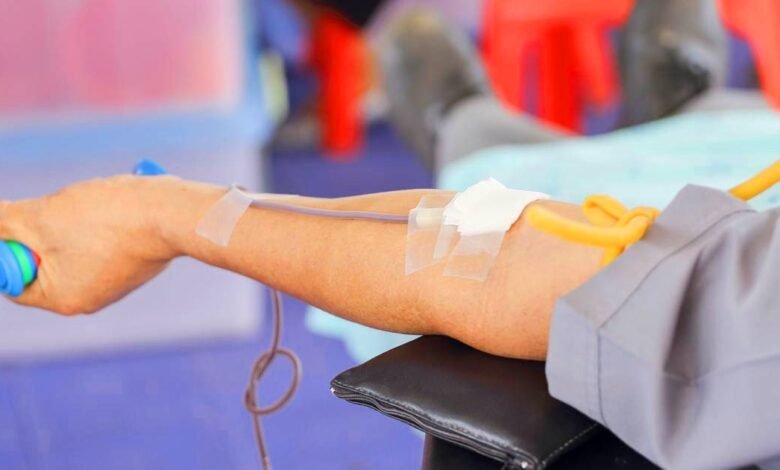Thalassemia: Diagnosis & Treatment in 2023

A thalassemia is a group of inherited blood disorders characterized by abnormal production of hemoglobin, the protein responsible for carrying oxygen in the red blood cells. It affects millions of people worldwide and can cause severe anemia and other complications if not properly diagnosed and treated. In this article, we will explore the diagnosis and treatment options available for thalassemia in 2023.
Thalassemia is a genetic disorder that affects the production of hemoglobin, leading to abnormal red blood cells. It is commonly found in regions where malaria is or was prevalent, as the genetic mutation conferring thalassemia offers some protection against the disease. In 2023, advancements in medical technology and understanding have led to significant progress in the diagnosis and treatment of thalassemia.
Read More: Understanding HIV Transmission
Understanding Thalassemia
Thalassemia is caused by mutations in the genes responsible for producing the alpha or beta chains of hemoglobin. These mutations disrupt the normal production of hemoglobin, resulting in the formation of abnormal red blood cells. Depending on the specific genetic mutation, thalassemia can be classified into different types, such as alpha thalassemia and beta thalassemia.
Types of Thalassemia
There are several types of thalassemia, including:
- Alpha thalassemia: This type is caused by a mutation in the genes responsible for alpha chain production. It can range from a mild form with no symptoms to a severe form that requires lifelong treatment.
- Beta thalassemia: This type occurs due to mutations in the genes responsible for beta chain production. It can be further classified into thalassemia minor, thalassemia intermedia, and thalassemia major, depending on the severity of symptoms.
Signs and Symptoms
The signs and symptoms of thalassemia vary depending on the type and severity of the condition. Common symptoms include fatigue, weakness, pale skin, delayed growth and development, bone deformities, and jaundice. In severe cases, thalassemia can lead to complications such as heart problems, organ damage, and an increased risk of infections.
Diagnostic Tests for Thalassemia
To diagnose thalassemia, various tests are available, including:
- Complete blood count (CBC): This test measures the levels of different blood cells and can help identify anemia.
- Hemoglobin electrophoresis: This test determines the types and amounts of hemoglobin present in the blood, helping to differentiate between different forms of thalassemia.
- DNA analysis: Genetic testing can detect specific mutations associated with thalassemia and confirm the diagnosis.
Genetic Counseling and Screening
Genetic counseling and screening play a crucial role in managing thalassemia. Couples planning to have children can undergo genetic counseling to understand their risk of passing thalassemia to their offspring. Genetic screening tests can identify carriers of thalassemia genes and help in making informed decisions about family planning.
Treatment Approaches
The treatment of thalassemia aims to manage symptoms, prevent complications, and improve the quality of life for individuals with the condition. The treatment options include:
Blood Transfusions and Iron Chelation Therapy
In severe forms of thalassemia, regular blood transfusions may be necessary to maintain adequate hemoglobin levels. However, repeated transfusions can lead to iron overload in the body. Iron chelation therapy, using medications that remove excess iron, is often used to prevent organ damage due to iron accumulation.
Stem Cell Transplantation
Stem cell transplantation, also known as bone marrow transplantation, is a potentially curative treatment for thalassemia. It involves replacing the patient’s damaged bone marrow with healthy stem cells from a compatible donor. This procedure can restore normal blood cell production and eliminate the need for lifelong transfusions.
Gene Therapy
Gene therapy is an emerging treatment approach for thalassemia. It involves modifying the patient’s own cells to correct the genetic mutations responsible for the condition. Although still in experimental stages, gene therapy shows promising results and may offer a potential cure in the future.
Managing Thalassemia Symptoms
Apart from specific treatments, managing thalassemia symptoms and complications is essential. This can include regular monitoring of iron levels, vaccinations to prevent infections, folic acid supplementation, and maintaining a healthy lifestyle with proper nutrition and exercise.
Supportive Care and Lifestyle Modifications
Living with thalassemia requires ongoing support and care. Patients may benefit from support groups, counseling services, and access to educational resources. Lifestyle modifications, such as avoiding activities that may lead to injury or infection, can also contribute to overall well-being.
Ongoing Research and Future Prospects
Medical research continues to advance our understanding of thalassemia and develop new treatment options. Ongoing studies focus on improving stem cell transplantation techniques, exploring novel gene therapy approaches, and investigating targeted therapies to manage specific symptoms and complications.
Conclusion
In conclusion, the diagnosis and treatment of thalassemia in 2023 have seen remarkable progress. Through early detection, accurate diagnosis, and access to appropriate treatment options, individuals living with thalassemia can significantly improve their quality of life. Advances in stem cell transplantation, gene therapy, and supportive care have provided new avenues for managing this genetic blood disorder.
Additionally, ongoing research continues to expand our knowledge of thalassemia and develop innovative treatments. Emerging therapies, such as gene therapy, hold promise for potential cures in the future.
Read More: The Female Fertility System: Problems & Its Treatments
FAQs
Can thalassemia be prevented?
Thalassemia is a genetic disorder, and currently, there is no known way to prevent it. However, genetic counseling and screening can help individuals make informed decisions about family planning.
Are there any alternative treatments for thalassemia?
While there are no alternative treatments that can cure thalassemia, ongoing research and clinical trials are exploring new therapeutic approaches, such as gene therapy, to provide more options in the future.
Is thalassemia curable?
Depending on the severity and type of thalassemia, curative treatments such as stem cell transplantation can offer a potential cure. However, the availability and suitability of these treatments depend on individual circumstances.
How can I support a loved one with thalassemia?
Supporting a loved one with thalassemia involves providing emotional support, participating in their care, and helping them access resources such as support groups and educational materials.
Where can I find more information about thalassemia?
You can find more information about thalassemia from reputable medical websites, and thalassemia support organizations, and by consulting healthcare professionals experienced in managing thalassemia.







